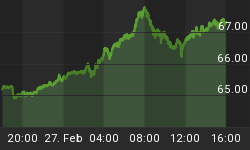"The past does not repeat itself, but it rhymes." -- Mark Twain
Series - Part 1 of 7
Part 1: The Current Investment Landscape
Part 2: Germany's Inflation In The 1920s
Part 3: The Dollar vs. Gold - You Should Care
Part 4: U.S. Stocks, Inflation, and Relative Valuations
Part 5: Commodities In Today's World
Part 6: Investing In A 'Flat World'
Part 7: Global Real Estate, Inflation, and Relative Valuations
Part 1: The Current Investment Landscape
Alan Greenspan's' "irrational exuberance" speech was delivered in 1996 (roughly 10 years ago). An argument can be made that the continued inflation of the money supply during the last decade has enabled investors to remain "irrationally exuberant" while participating in the stock, bond, currency, and real estate markets. As a professional money manager or an individual investor, an understanding of inflation may be key when setting out to construct a profitable mix of investments or to preserve your hard-earned wealth.

For the purpose of this series of articles, we will consider inflation to be an increase in the money supply either via electronic means (bank deposits) or the printing press. A rise in the price of an asset or consumer good is the result of many factors, including an increase in the money supply. While we like the result, an increase in the value of stocks, bonds, real estate, etc., is a symptom of inflating the money supply. From the consumer's point of view, there is good price inflation (assets) and bad price inflation (consumer goods).
The last decade has been a difficult period to be a hardcore value investor. Any historical knowledge of PE ratios at bull market peaks and bear market bottoms leaves you scratching your head when examining stock market behavior since 1998. Based on the history of bull and bear market cycles in almost any asset class from tulip bulbs to stocks, the stock market should have never gone to the unheard of extremes in 2000, nor should stocks have bottomed at eye-popping PEs in late 2002. In a similar but less pronounced light, historical price-to-rent ratios, PEs for real estate, say the prices for residential real estate are extended in many U.S. cities.
To date, our current reality has yet to follow these historical valuation scripts. Stocks did go off the charts in 2000 and they did bottom in 2002. Much to the amazement of the students of real estate booms and busts, the current boom has had impressive staying power. What has enabled both stocks and real estate to defy historical valuation checks and balances? While there are many forces at work, the increase in the money supply on a global basis and the lure of credit via low interest rates are near the top of the list.
That's great, but how does that help us now? Barring a radical change in policy, you can expect more of the same from the Federal Reserve and global central banks in the future. Why? The economy is so dependent on the "wealth effect" created by elevated stock and real estate prices that they have no choice but to attempt to keep them elevated. Therefore, on a long-term basis, you can expect the aggressive expansion of the global money supply to continue, and you can expect the Federal Funds Rate to be lowered at the first sign of any serious economic trouble. As a taxpayer, professional money manager, and consumer, I do not approve of these policies, but this is the world we currently live in. An investor's ability to come to grips with reality, like that reality or not, is an important first step to wealth creation and preservation.
This is not to imply that historical valuations will never be relevant again. They will be, but not until people stop buying into the Federal Reserve's assertion that "core" inflation is low and debt at all levels of the economy is not cause for concern. It does not appear that the music is about to stop based on current conditions and public perceptions. You can expect us to enter another FED easing cycle at some point in the not too distant future.
From an investment standpoint, this means you need to prepare for the next inflationary cycle. Since a basic understanding of an entire inflationary cycle (the good and the bad) may be critical to creation and preservation of wealth, we will take a quick look at Germany's infamous inflationary period, which began in 1923, in Part 2 of this series. Parts 3 through 7 will focus on five major investing themes that will impact all investors as this inflationary cycle continues to play out.
The focus of this series will be on how to approach the markets based on what is actually happening in our inflationary world. It will not focus on serious commentary of current economic policy or make any firm predictions about the future. It will simply attempt to understand where we are today in a historical context and where we may (emphasis on may) be headed based on a historical context. We can use Mark Twain's wisdom to our advantage, "The past does not repeat itself, but it rhymes."
Coming Soon: Part 2 of 7 - Germany's Inflation In The 1920's















